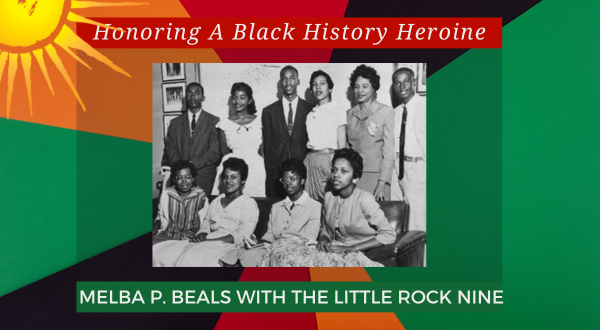Honoring Melba Pattillo Beals
NETWORK Staff
February 29, 2024
Mary Cunningham
February 9, 2018
“The task that remains is to cope with our interdependence – to see ourselves reflected in every other human being and to respect and honor our differences.”-Melba Pattillo Beals
Two years ago a friend and I got into a deep conversation about faith. We navigated the winding roads of what it means to believe in God, where we felt God’s presence, and how to maintain our faith when met with resistance. After our conversation my friend recommended a book to me – Warriors Don’t Cry, a memoir written by Melba Pattillo Beals about her experience integrating Little Rock High in Arkansas.
A few months later, I bought the book and was ready to delve in. As I sat down to read, Melba’s words washed heavy over me. I was pulled out of my own world of petty fears into the sharp reality of a young girl who feared for her life because of the color of her skin; at age 14, Melba was forced to grow up fast, saddened by the childhood experiences she never got to have. My friend and I talked about how to maintain faith during moments of resistance, but this was on a whole other level.
Melba Pattillo Beals was one of the Little Rock Nine, a group of African American students chosen to integrate the all-white Central High in Little Rock Arkansas in 1957 following the Brown v. Board decision in 1954. Upon entering Little Rock High School on the first day of classes, a huge white mob shouting racial slurs and threats greeted Melba and the other students. Melba and her mom barely escaped. Even when the students were finally able to enter the school, they were harassed and condemned by white peers, teachers and staff members. Melba had peanut and glass smeared on her seat, she was tripped, pushed, and almost blinded by a student who threw acid into her eyes. President Eisenhower sent in members of the 101st Airborne Division to accompany the students to and from their classes just because the violence was so bad. Physically and mentally tormented, Melba’s faith and her family support remained her inner strength. Despite all the hatred around her, she continued to push forward, paving the way for women and men of color who came after her.
Warriors Don’t Cry woke me up. It made me realize how powerful it is when men and women – particularly people of color — are brave enough to go against the grain to fight for their rights and whose inner strength defies the often negative, hateful world we live in. They are the ones pushing against, resisting, and reshaping our society. I am inspired by Melba who despite all the negative energy around her, not only managed to persist, but managed to trust in God and to forgive. Even when she was stripped down to survival mode, she prevailed.
The book also forced me to identify and confront my own white privilege. Melba and other women and men of color have made sacrifices and continue to make sacrifices that I know as a white woman I will never have to face. I will never undergo racial discrimination, physical attacks, or fear for my life because of the color of my skin. Instances of racism like the ones in Melba’s story may seem less prevalent in today’s society. However, they still exist – just in varying forms. Racism is entrenched in our society, its practices, its institutions. And white privilege continues to inform our outlook and our actions. In order to truly confront these issues, we need to go beyond our comfort zones, educate ourselves, and truly confront our own white privilege if we are not men and women of color. Black History Month is a great time to start this journey. I am honored to share Melba’s story in hopes that others will take the time to learn about the amazing African American men and women who have moved our nation forward and made us more racially accountable.







